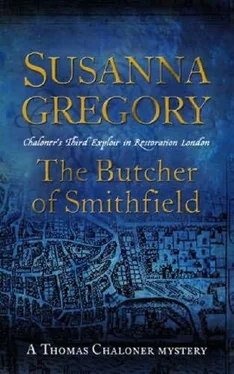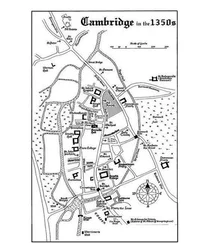Susanna Gregory - The Butcher Of Smithfield
Здесь есть возможность читать онлайн «Susanna Gregory - The Butcher Of Smithfield» весь текст электронной книги совершенно бесплатно (целиком полную версию без сокращений). В некоторых случаях можно слушать аудио, скачать через торрент в формате fb2 и присутствует краткое содержание. Год выпуска: 2010, ISBN: 2010, Издательство: Little, Brown Book Group, Жанр: Исторический детектив, на английском языке. Описание произведения, (предисловие) а так же отзывы посетителей доступны на портале библиотеки ЛибКат.
- Название:The Butcher Of Smithfield
- Автор:
- Издательство:Little, Brown Book Group
- Жанр:
- Год:2010
- ISBN:9780748124541
- Рейтинг книги:5 / 5. Голосов: 1
-
Избранное:Добавить в избранное
- Отзывы:
-
Ваша оценка:
- 100
- 1
- 2
- 3
- 4
- 5
The Butcher Of Smithfield: краткое содержание, описание и аннотация
Предлагаем к чтению аннотацию, описание, краткое содержание или предисловие (зависит от того, что написал сам автор книги «The Butcher Of Smithfield»). Если вы не нашли необходимую информацию о книге — напишите в комментариях, мы постараемся отыскать её.
The Butcher Of Smithfield — читать онлайн бесплатно полную книгу (весь текст) целиком
Ниже представлен текст книги, разбитый по страницам. Система сохранения места последней прочитанной страницы, позволяет с удобством читать онлайн бесплатно книгу «The Butcher Of Smithfield», без необходимости каждый раз заново искать на чём Вы остановились. Поставьте закладку, и сможете в любой момент перейти на страницу, на которой закончили чтение.
Интервал:
Закладка:
‘He had lots, but the closest was William Smegergill — a Court musician, like him. Do you know Smegergill? He has a ravaged complexion, because of a pox when he was a child.’
The description was not familiar, but Chaloner made a mental note to track Smegergill down. ‘Did you ever see Maylord with a solicitor called Newburne?’
The verger was disdainful. ‘Of course not! Maylord had more taste than to associate with the likes of him. Why do you ask?’
‘Because they both died from eating cucumbers.’
‘Coincidence,’ replied the verger, so promptly that Chaloner knew it was an observation that had been made before. ‘I could cite three other men who have been taken by cucumbers this year alone — namely Valentine Pettis the horse-trader, and a pair of sedan-chairmen. If people will eat cucumbers, then they must bear the consequences.’
‘You think they are that dangerous?’ asked Leybourn.
The verger nodded fervently. ‘Oh, yes! They are green, see, and no good will come of feeding on greenery. Have you finished here? Only I need to wash the nave floor. Mud gets tracked everywhere this weather, and this is the Parliament church, so we like to keep it looking nice.’
Chaloner stared at Maylord, and was suddenly seized with the absolute conviction that cucumbers were innocent of causing his death. Physicians, he knew, considered cucumber poison to be insidious — its vapours collected in the veins, and any ill effects tended to occur gradually, not the moment the fruit was taken into the mouth. Ergo , either Maylord had suffered the kind of seizure that was relatively common in older people, or someone had done him harm. Moreover, the musician’s recent agitation suggested something was sorely amiss, and it was odd that he should so suddenly die. Why anyone would want to hurt him was beyond Chaloner, and he made a silent oath to find out exactly what had happened, and to ensure that whoever was responsible would pay.
He nudged Leybourn, and indicated the door with a nod of his head. He wanted to examine Maylord more closely, but he could hardly do it with the verger watching. Ordinarily, he would have bribed the man to look the other way, but sixpence was unlikely to be enough. It took a moment for Leybourn to understand what he wanted, and when he did, he slapped his hand across his mouth.
‘I am going to be sick,’ he announced.
The verger gazed at him in horror. ‘Not down here!’
‘Escort me upstairs, then. My friend can finish paying his respects, and you can take me to fresh-’ But the verger did not want a mess, and was already hauling Leybourn away.
Chaloner waited until he could no longer hear their voices, then inspected the musician’s hands, head and neck, looking for signs that he had been brained, strangled or had fought an attacker. There was nothing. Then he leaned close to Maylord’s mouth and sniffed, but it was an imprecise way to look for poison, and he was not surprised when it told him nothing. He stood back, reluctant to move clothes in a hunt for wounds, because he suspected the verger would not be long and he did not want to be caught doing something sinister. Then he saw an odd discoloration on the face: Maylord’s lips were bruised.
Gently, he opened the mouth. An incisor was broken, and when he touched it with his finger, the edge was sharp, suggesting it had happened shortly before death. Further, teeth marks were etched into Maylord’s lower lip. Chaloner had seen such injuries before — when someone had taken a cushion and pressed it hard against a victim’s face. It was an unpleasant way to kill, because it involved several minutes of watching a man’s losing battle for life at extremely close range. The fact that the culprit had then planted evidence to ‘prove’ Maylord had died from eating cucumbers suggested a ruthlessness that made Chaloner even more firmly resolved to see him on the gallows.
It was still raining when they emerged from the church, Leybourn resting a hand on Chaloner’s shoulder to maintain the pretence of queasiness. Heavy clouds brought an early dusk, and lamps already gleamed in Westminster Hall and the shops around the old clock tower. They set slanting shafts of light gleaming on the wet cobbles, and everywhere people seemed to be in a hurry, wanting to be at home on a night that promised cold and miserable weather.
‘Smegergill,’ said Chaloner as they walked. ‘Do you know him?’
Leybourn shook his head. ‘Thurloe might, though.’
Chaloner had wanted to visit Thurloe anyway, to tell him he was home, so he and Leybourn walked up King Street, then along The Strand towards Chancery Lane and Lincoln’s Inn. Boys with burning torches offered to light their way, and Leybourn hired one after he skidded and almost fell in some slippery entrails that had been dumped outside a butcher’s shop.
‘Are you sure you should be doing this?’ he asked Chaloner as they went. ‘Visiting Thurloe, I mean. He was Spymaster General for Cromwell’s government, and he is still considered a dangerous enemy of the state, despite having been dismissed from all his posts and living in quiet retirement. You do work for the Lord Chancellor, after all.’
‘The Earl does not consider Thurloe a threat, and nor does he object to my continued association with him. It would not matter if he did, anyway. He cannot dictate who my friends should be.’
‘Some would say that puts a question-mark over your loyalty to him. Thurloe hired you and trained you, and you remained under his command for nigh on ten years.’
‘All of it overseas,’ Chaloner pointed out. ‘Not once did I spy on the King or his retinue — I only ever gathered intelligence on hostile foreign regimes. And Clarendon knows it.’
Leybourn raised his hands defensively. ‘ I do not doubt your allegiance to the Royalist government — I am just telling you what others might say.’
Chaloner made no reply, and Leybourn dropped the subject when they arrived at their destination. Lincoln’s Inn, one of four London establishments that licensed lawyers, comprised a range of buildings around two pleasant courtyards. There was a large private garden to the north, and Chaloner was astonished when he saw the change in it. When he had left, there had been an overgrown chaos of elms, beeches and oaks, all shading long-grassed meadows. Now the trees had been pruned or felled, and everything bespoke order and neatness. There were gravelled paths for the benchers — the Inn’s ruling body — to stroll around, and little box hedges kept other plants within their allotted spaces. It looked more like an idealised painting than a real garden.
‘Does Thurloe mind this?’ The ex-Spymaster had derived much pleasure from his early-morning walks in the wilderness, and Chaloner was not sure the tamed version would be quite the same.
Leybourn smiled. ‘He loves it, much to his surprise. The paths mean he can keep his feet dry, and you know what he is like with his health — always fretting about becoming ill.’
They made their way to the smaller and older of the Inn’s yards, known as Dial Court. Back in the spring, Dial Court had boasted a sundial — a massively ugly affair of curly iron and oddly placed railings, inexplicably placed so it rarely caught the sun. It had been removed, and in its place was something that looked like a hollow globe.
‘It is a device for tracking the movements of the stars,’ explained Leybourn, seeing Chaloner look curiously at it. ‘The old sundial rusted in the wet weather, and pieces kept falling off, so I recommended this instead. The benchers are very pleased with it, and spend hours out here on clear nights.’
Chaloner doubted there would be many of those — even when it was not raining, London’s skies were filled with the smoke from thousands of fires. He followed Leybourn up the stairs to Chamber XIII, where John Thurloe had a suite of rooms that were all wooden panels and leather-bound books. They were warm, comfortable and one of few places where Chaloner felt truly safe.
Читать дальшеИнтервал:
Закладка:
Похожие книги на «The Butcher Of Smithfield»
Представляем Вашему вниманию похожие книги на «The Butcher Of Smithfield» списком для выбора. Мы отобрали схожую по названию и смыслу литературу в надежде предоставить читателям больше вариантов отыскать новые, интересные, ещё непрочитанные произведения.
Обсуждение, отзывы о книге «The Butcher Of Smithfield» и просто собственные мнения читателей. Оставьте ваши комментарии, напишите, что Вы думаете о произведении, его смысле или главных героях. Укажите что конкретно понравилось, а что нет, и почему Вы так считаете.












